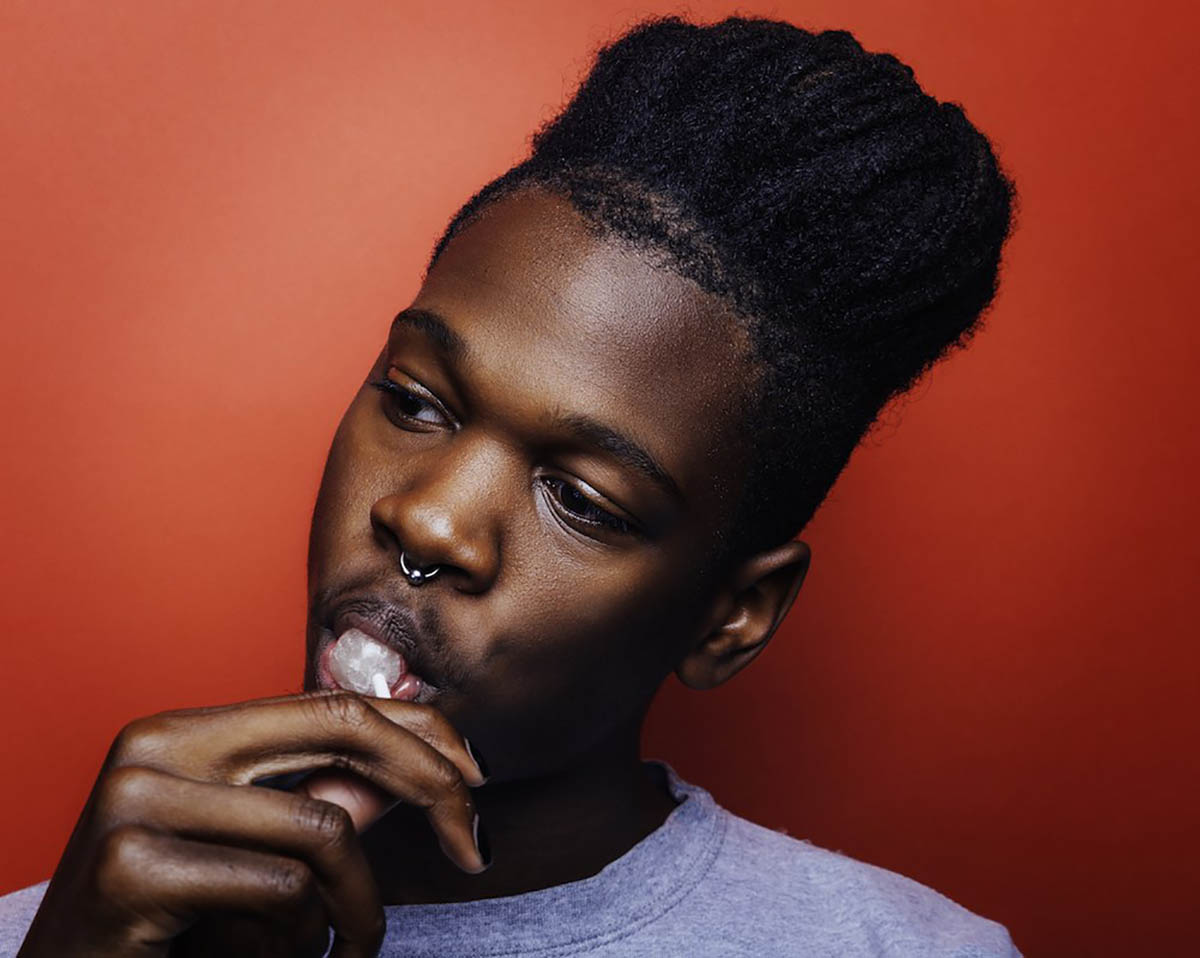Interview: Shamir, Whose Ratchet Tour Comes to Cambridge This Week
This post originally appeared on Vanyaland.

Shamir / Courtesy photo by Matthew Parri Thomas
Shamir Bailey, better known these days simply by his stage name, Shamir, loves a good Vegas buffet. In many ways, this comes as no surprise, since his music plays to a variety of tastes.
The freshly turned 21-year-old grew up in Las Vegas, where he and his friends would sometimes hang out in storm drains, he says. Or where his aunt used to have a few musician friends come over and help turn the poems she wrote into lyrics for songs. Or where “there were lots of Mormons.” These and other experiences, along with his musical inspirations—from Alvvays to Alexz Johnson (“I’ve been obsessed with her my whole life”) to Tegan and Sara—helped mold Ratchet, Shamir’s colorful, unpredictable debut.
Released in May via XL Recordings, Rachet is unapologetically brash and unforgettably catchy. It’s difficult to ascribe a genre to the collection of songs—each of which, Shamir proudly proclaims, could stand on their own as singles. He’s not wrong.
“On the Regular,” the actual lead single and the sound of a popular Android TV ad campaign, could be best described as alt-hip-pop new wave. Or maybe none of the above. But the lyrics are very punk, reading like a declaration of self-assuredness: “Five-foot-ten, about a buck twenty/Skinny as a rod but still won’t fuck with me,” and the instantly memorable “Don’t try me, I’m not a free sample.” A love song titled “Demon” is another standout. It’s a ballad of sorts, chronicling how Shamir can’t go back to the life he led before his lover entered his life. “I’m a demon, baby,” he offers, “you’re the beast that made me.”
This Wednesday, Shamir plays The Sinclair in Cambridge with Los Angeles-based alt-pop singer HANA. Last week we spoke with Shamir over the phone before his show in Nashville, a city that was “not as country as I’d hoped it would be,” he says. We talked about making music for music’s sake, how anyone can be a hot mess, and how Shamir calls his younger fan base his “baby ratchets.”
I wanted to start by talking to you about opening for Marina and the Diamonds on the Neon Nature tour and what that was like, touring with her versus headlining your own show.
Marina was the first opening slot I’ve had. It was pretty cool just opening up for her. It was so fun. She’s just so fun.
One of the things that I think is really fascinating about Marina is that she’s this pop persona, but she’s able to go beyond that. Her music reflects the persona she’s taking on at that time. You’ve spoken a little bit before about matching up your image and your music. Could you speak more to that?
Well, I think it’s less about image. I just do music. Music is about my life—what I go through as a person. It’s not like I put on a persona in my music; it’s just my music. It’s me 100 percent. I bring my whole self to the table.
What are some of the experiences that led to the creation of Ratchet? For example, what was the inspiration for “In for the Kill”?
“In for the Kill” is about how hard it is for me to be a musician and do what I love and literally leave everything else I love behind—friends, family, stability, anything else after that.
It’s a huge trade-off, especially when you’re going on tour, too. What are some of the things you’ve had to give up while on tour?
The biggest thing I’d say is my dog. I miss him so much. I literally have not seen him the entire summer. He’s a little mutt.
One of the other things I want to talk about too was the naming of the album. Why name it Ratchet as opposed to something else, like Shamir since it’s your debut or something like that?
I’m from Vegas, so it’s a big homage to my hometown and my friends and the ratchet part of that. Me and my friends always refer to each other as “ratchet,” so it’s a big homage to where I come from.
How do you remain grounded and feel connected to Vegas while you’re on tour?
It’s definitely harder on tour, since I’m never there, ever. There are just not a lot of artists coming out of Vegas because there’s not really a platform or outlet in Vegas. There are a lot of talented people in Vegas.
Before you were signed, were you playing shows locally? What were you doing?
I was doing only a handful of shows with my old band.
So the shows early on—how do they compare to the ones you’re doing now?
Well, they were a little less professional. With the band, it was just us making noise on stage first and foremost. Like now, it’s not like a band thing. It’s more of a solo artist thing. All eyes are on me.
Do you ever feel the pressure that may come from that?
Not so much pressure—I’m just not the type of person who likes to be the center of attention.
Let’s switch gears and talk about “Hot Mess” for a second… that song is interesting because you’ve used the phrase “hot mess” to describe a male, when so often in media and even in my own friend groups, that phrase is attributed more so to females. I have a lot of female friends who call each other a “hot mess”…
I didn’t know women were the only ones who could be called “hot messes.” I didn’t know that was a thing… I throw around that phrase, “hot mess,” to everyone—men, women, babies, people.
Everybody can be a “hot mess”?
Anybody can be a damn hot mess.
You’ve also said that you’d never really thought about doing “straight people music”—like, it’s not something that really crosses your mind. It’s just “music” to you. It’s not “gay people music.” It’s not “straight music.” It’s not “trans music.” It’s just music. It’s interesting how we, as a society, are so eager to place labels onto music.
Music is music. I mean, when that topic in conversation comes up—there’s “Christian music” and then there are Christian musicians that do music, you know…that’s how I feel about my music. It transcends and reaches everyone. You can box yourself in however you want to. You can be any type of musician and that’s your prerogative, but I just like to do music that relates to everyone. It’s not going to be perfect.
What’s cool about your stuff is that it’s not necessarily “black music” or “white music”—there’s no racial implication, either. Is that something that you consciously work toward, or are you just doing you and sharing it with the world?
Yeah, it’s more just everything I am. I don’t think about everything I do. It’s more just me being me. I love it.
You also have a very diverse audience. Your fans totally run the spectrum. What has been the most memorable fan interaction that you’ve had thus far?
I think my favorites are the all-ages shows. Young kids come, and I love it. I get to see what are called my “baby ratchets” [laughs].
How old are the “baby ratchets”?
There’s this one little boy in England. He’s hit me up on Instagram and everything, and he’s just so adorable. He came to the shows when I was still an opener. And there’s this other little girl—she’s like 10—and she’s also so adorable. She and her dad came up to me, and she was like, “I love your music, I love you,” and everything. I just love that.
From what I’m hearing—I don’t want to use the words “role model”—but you are leaving an impact on these “baby ratchets” kids’ lives. How do you feel about that?
It feels great. It’s cool. I’m glad that they, you know, can connect with what I do, especially at a young age. When I was 9 or 10 and even 13, I was listening to stuff that people didn’t know I knew about.
Today, there’s just so much more out there to consume, too. There’s so much noise. As an artist, how do you break through that?
I don’t try to, you know? I think there are a lot of problems with artists—and this is really annoying to me—they’re not just making music to make music. It’s all about reach. It’s a bunch of selfish stuff as well. For me, it’s about being a musician. Everything else—I don’t care. I make my art, my music. If you relate to it, cool. If you don’t, on to the next one. I don’t think about what everybody else is selling. I don’t think about how anyone else perceives my music. It’s not my job to think about those things.
It sounds like you’re more interested in art for art’s sake and music for music’s sake, as opposed to being like a mouthpiece or using this as a platform. Is that accurate?
Exactly.
So what can expect from the tour? Can we expect something more along the lines of your recent performance on The Late Show with Stephen Colbert? Like a live band sort of thing?
Yeah, I’ve always had a live band. It’s like a big party to me. There’s no dancers. There’s no crazy smoke and mirrors. There’s no costume changes. It’s just me vibing with everyone [laughs].
Part of that too is the energy of the crowd, because that influences the energy you bring to the performance…
Oh, totally. It’s literally a 50/50.
Have you ever been in a situation where the crowd sucked?
Oh, totally. Totally. Then it becomes like a job. It’s like something I have to do [laughs].
It shouldn’t feel that way. When you’re on tour, what do you do when you’re not performing? Do you get to see the city?
Yeah, sometimes. We usually go eat. The band really likes to go bowling, but I suck at bowling, so I just sit there and watch them yell at each other and fight. It’s funny. Sometimes, if I have a friend in that city, I’ll hang out with them. It just depends.
Looking forward to seeing you in the Boston area! Should be a good show.
I love Boston. Some of my favorite people live there. My last show there was so crazy. I’m so happy that we were able to find the time to go back again this year.
Shamir plays with HANA: $17 advance/$20 day of show, November 18, 8 p.m., Sinclair, 52 Church St., Cambridge. Buy tickets.


